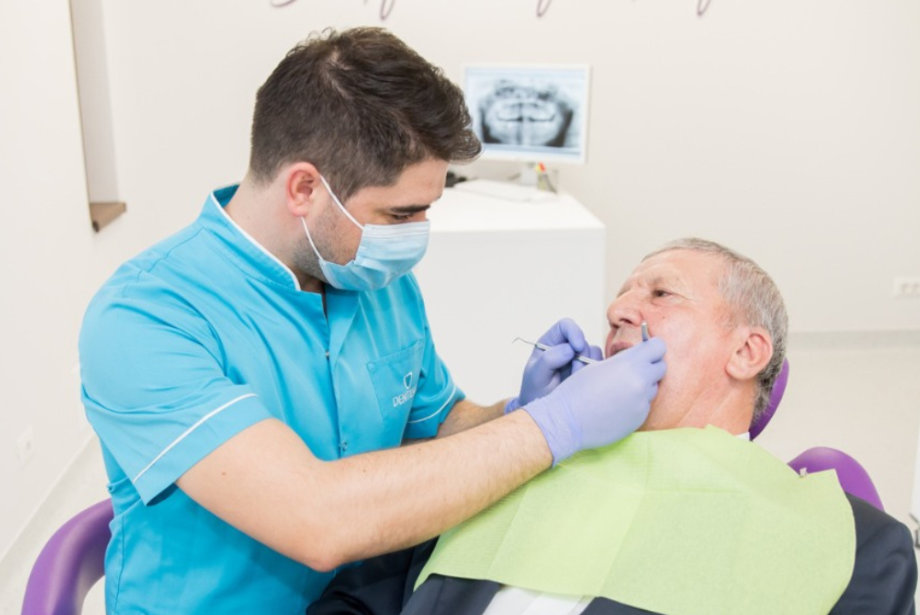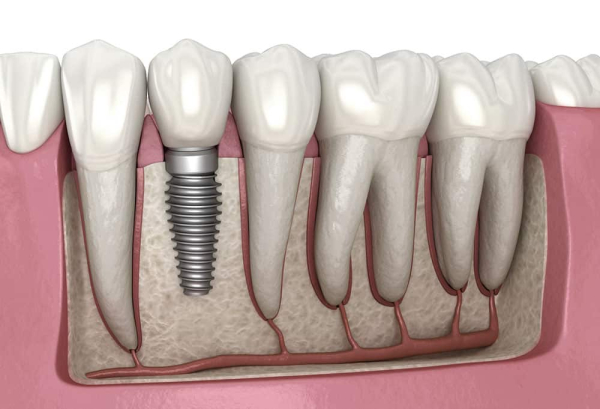Here’s what you need to know about the dental implant procedure

Dental implant treatment is currently one of the most sought-after dental procedures. Studies show that patients are beginning to recognize the need and importance of replacing missing teeth.
Here are 7 of the most common questions that the medical team at DENTESSE clinics receives from patients.
1. What is a dental implant?

The dental implant is the best solution for replacing one or more missing teeth. It is made from a biocompatible material with the human body, which is placed in the jawbone and perfectly replaces the root of the lost tooth. It is as durable as a natural and healthy tooth.
The dental implant has a statistically confirmed success rate of over 99%, which is why it has become the primary option for patients who have lost their natural teeth.
2. What are the advantages of a dental implant?
More and more patients are beginning to understand the advantages that dental implant treatment offers over traditional methods for replacing missing teeth. The main benefit of the dental implant is that it prevents bone resorption and tooth migration, as it perfectly replaces the root of the natural tooth.
Additionally, the process of cleaning the implant is much more natural and convenient (similar to caring for natural teeth), unlike removable dentures that must be taken out of the mouth for each cleaning. Also, after the implant is placed, patients do not feel any discomfort, and the final appearance is very natural.
3. Who can undergo this treatment?
Anyone can opt for treatment to replace one or more missing teeth with a dental implant. The only condition is a minimum age of 18 years. After a set of general health tests, the dentist can approve the treatment.
4. How does the surgical procedure for inserting a dental implant proceed?
The insertion of the dental implant is a surgical procedure performed exclusively in the dentist’s office. The entire procedure is done under local anesthesia, so the patient feels no pain or discomfort.
After the implant is inserted into the gum, the doctor may recommend anti-inflammatory and pain-relieving medications to help the patient through the healing process. In this initial healing stage, diet also plays an important role: it is recommended to consume soft foods like soups and soft dishes.
Healing after a dental implant varies depending on the bone quality and the patient’s health status.
5. Why is the healing period for the implant important?
Most patients wish to benefit from dental implants and prosthetic work as quickly as possible, but in over 90% of cases, tooth loss (especially if left untreated for a long period) leads to bone resorption, which requires a more elaborate treatment plan.
It is important for the implant to heal completely, so it can be fully integrated and stable. This step is essential for the implant’s longevity.
6. How do you choose a dental implantologist?
To ensure the success of dental implant treatment, most patients seek the professional services of dental clinics.
The expertise of the medical team, modern working techniques, and digital technologies used make the DENTESSE Regional Implantology Center the best option when choosing where to have such treatment.
Here, you benefit from:
- An experienced medical team
- Dedicated offices for oro-maxillofacial surgery and oral implantology
- Digital technologies that ensure precision and safety
- A 3D digital radiology center with reduced radiation
- A post-operative room
- A fully digitalized dental technique laboratory
- A modern and comfortable environment
Find out more about the dental implant treatment directly from one of the implantologist specialists at DENTESSE clinics!
Share this article, choose your platform!
Here’s what you need to know about the dental implant procedure

Dental implant treatment is currently one of the most sought-after dental procedures. Studies show that patients are beginning to recognize the need and importance of replacing missing teeth.
Here are 7 of the most common questions that the medical team at DENTESSE clinics receives from patients.
1. What is a dental implant?

The dental implant is the best solution for replacing one or more missing teeth. It is made from a biocompatible material with the human body, which is placed in the jawbone and perfectly replaces the root of the lost tooth. It is as durable as a natural and healthy tooth.
The dental implant has a statistically confirmed success rate of over 99%, which is why it has become the primary option for patients who have lost their natural teeth.
2. What are the advantages of a dental implant?
More and more patients are beginning to understand the advantages that dental implant treatment offers over traditional methods for replacing missing teeth. The main benefit of the dental implant is that it prevents bone resorption and tooth migration, as it perfectly replaces the root of the natural tooth.
Additionally, the process of cleaning the implant is much more natural and convenient (similar to caring for natural teeth), unlike removable dentures that must be taken out of the mouth for each cleaning. Also, after the implant is placed, patients do not feel any discomfort, and the final appearance is very natural.
3. Who can undergo this treatment?
Anyone can opt for treatment to replace one or more missing teeth with a dental implant. The only condition is a minimum age of 18 years. After a set of general health tests, the dentist can approve the treatment.
4. How does the surgical procedure for inserting a dental implant proceed?
The insertion of the dental implant is a surgical procedure performed exclusively in the dentist’s office. The entire procedure is done under local anesthesia, so the patient feels no pain or discomfort.
After the implant is inserted into the gum, the doctor may recommend anti-inflammatory and pain-relieving medications to help the patient through the healing process. In this initial healing stage, diet also plays an important role: it is recommended to consume soft foods like soups and soft dishes.
Healing after a dental implant varies depending on the bone quality and the patient’s health status.
5. Why is the healing period for the implant important?
Most patients wish to benefit from dental implants and prosthetic work as quickly as possible, but in over 90% of cases, tooth loss (especially if left untreated for a long period) leads to bone resorption, which requires a more elaborate treatment plan.
It is important for the implant to heal completely, so it can be fully integrated and stable. This step is essential for the implant’s longevity.
6. How do you choose a dental implantologist?
To ensure the success of dental implant treatment, most patients seek the professional services of dental clinics.
The expertise of the medical team, modern working techniques, and digital technologies used make the DENTESSE Regional Implantology Center the best option when choosing where to have such treatment.
Here, you benefit from:
- An experienced medical team
- Dedicated offices for oro-maxillofacial surgery and oral implantology
- Digital technologies that ensure precision and safety
- A 3D digital radiology center with reduced radiation
- A post-operative room
- A fully digitalized dental technique laboratory
- A modern and comfortable environment
Find out more about the dental implant treatment directly from one of the implantologist specialists at DENTESSE clinics!




















